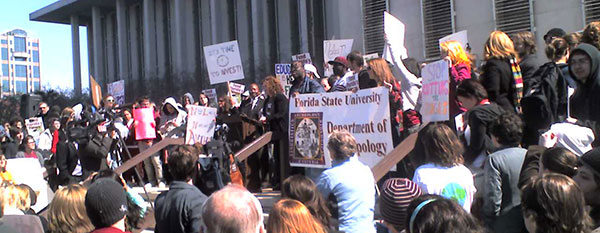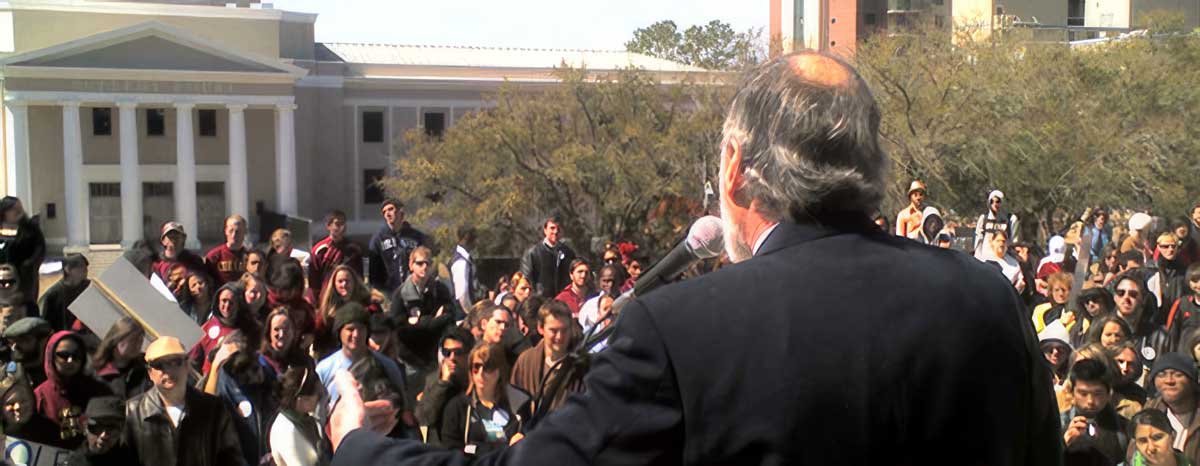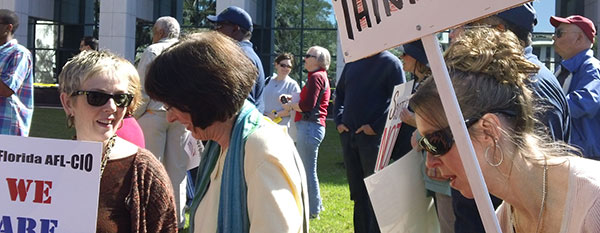Founding
UFF began in 1976, when faculty across the State University System voted for the United Faculty of Florida to be its exclusive collective bargaining agent . Over the next twenty-five years, UFF proceeded to negotiate a series of statewide contracts with the Board of Regents. During that time, UFF also played an active role lobbying the state legislature and promoting the interests of faculty in the public arena.
UFF & the Supreme Court
In the late 1990s, UFF provided key support for the plaintiffs in Kimel et al. v. Florida Board of Regents, in which FSU faculty members charged that salary compression effectively constituted age discrimination; this case ultimately was decided by the U.S. Supreme Court. Although the Court decided 5-4 against UFF, the case demonstrated that faculty working together can have a far stronger voice than they do alone.




Hands Off Our Union
In 2000, the Florida Legislature mandated a restructuring of higher education in Florida, which led Governor Bush to dissolve the Board of Regents. By 2003, governance had been devolved to Boards of Trustees at each of the eleven state universities, and FSU’s Board of Trustees refused to recognize UFF. Although a court later ruled that UFF’s status should not have been impacted by devolution, by then UFF had already responded by launching recertification campaigns at each of the State University System’s campuses.
In October 2003, the faculty at FSU reaffirmed its desire to be represented by UFF by a vote of 736 to 33. At the FSU School, which is a separate bargaining unit with a separate Collective Bargaining Agreement, the vote was 80 to 0. Although the recertification campaign was burdensome for UFF-FSU’s volunteer leadership and members, it had the unintended impact of leading to a new era of activism, as faculty recognized that they needed to be organized and vigilant in order to resist pressures that would impact working conditions and contractual rights at FSU.
Legal Challenges
In 2022, 2023, and 2024, the Florida legislature passed bills that seriously impaired our organizing efforts as well as our ability to do our jobs. Such legislation included an “anti-shielding” provision which allowed students to record class lectures without our consent as well as a bill mandating post-tenure review and restrictions to General Education course content.
Such censorship limited our students’ right to learn and our ability to provide students with the most up-to-date knowledge in our disciplines on important issues like race, gender, American history, and the environment. UFF took them to court, and as of winter 2025, we are awaiting the results
UFF Today
Part of the legislature’s attack was Senate Bill 256 which threatened that the UFF would be decertified if it did not get 60% of in-unit faculty to become members. Just as they did during the 2003 devolution, our UFF-FSU team rose to the challenge!
Within a year, we increased our membership from 43% to over 60%! The faculty at FSU stood up for their right to collectively bargain, to organize and have a voice in defense of their rights! Today, UFF-FSU is stronger than ever to meet the challenges that are sure to arise.
